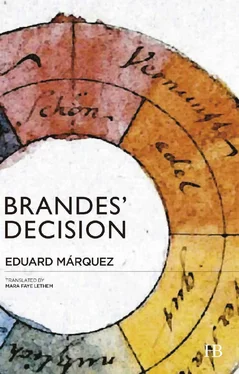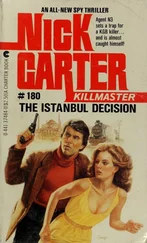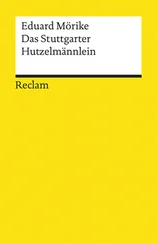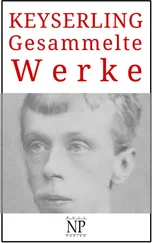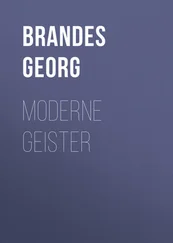The work I am most pleased with is the river that skirts the studio and leads into the forest. One day, seated on the bank, I was inspired to begin painting its pebbles. I’ve been doing it ever since. Stretch by stretch, yard by yard, I have turned the riverbed into a canvas of unpredictable stone, because the water, the iridescence of the colors, shadows, and reflections make every moment unique and surprising. It was also Alma’s favorite project. That was why she asked me, if she died before I did, to mix her ashes in with the pigments and paint the pebbles of her beloved spot, beneath the poplar where she liked to sit and read, or look out at the landscape.
I’m sure Erika would have found it ludicrous. Particularly once her typical bursts of enthusiasm had begun to lead her down into the catacombs. It started with isolated, abstract references to “the new birth of the fatherland” and the “renewal of lost hope.” Rhetoric that, gradually, became more concrete in the “great events that await us” beneath the protection of the “glorious leader” and the need to “cleanse society of undesirable elements.” As undesirable as Konrad’s Jewish friends, whom she wouldn’t allow into the house. It turns my stomach when I think of it.“Why won’t you let me play with Heini?” Konrad would ask her, confused.“Because it’s what’s best for you,” Erika would respond. And she considered the matter settled.
Her family wasn’t much help. When Erika’s father got wind of the profits involved, he didn’t hesitate to put the family factory to work for the war machine, disguising his eagerness to increase his personal fortune with an unbearable charade. It left my father very disenchanted; he never understood how his lifelong friend could be so unscrupulous.“We can never truly know people,” he declared. Then he shook his head, his disappointment written on his face.“Who would have thought it,” he added. “Bürckel sucking up to those scoundrels.” He died without ever comprehending it. And without forgiving him.
And there I was, in a fine fix. Living with Erika, protecting Konrad, painting against the grain, trying to detach myself from the fanatical crowd, keep myself on the margins of all that senselessness. . I still don’t know how I was able to stand it for so long. The hardest part was living with Erika when we no longer shared anything. We barely even shared responsibility for Konrad, because each of us, firmly convinced of our own ideas, went our own way. Poor Konrad. I remember as if it were yesterday the first time I secretly brought him to my studio so he could play with his friend Heini. I’d never seen him so confused. “What about Mom. . What’s Mom going to say?” he asked me. “Nothing. Because she doesn’t have to know about it, right?” I answered him. But not everything was that simple. At school, the marching lines of little Hitler admirers, the uniforms, his classmates, his lessons. . Everything was reason enough to get into an argument with Erika. It is hard to accept that someone you’ve loved madly can become a stranger. Or worse than a stranger: an enemy.
My father said that he had only argued with my mother once. It was over the photograph of the three of us on Rügen. It seems it vanished shortly after the photographer they’d met on the island’s cliffs sent them the copy he’d promised. Convinced that it was my mother’s fault, since she’d been spending all day rummaging through drawers and folders to put together my album, he goaded her so much that they ended up fighting. He admitted that he should have held his tongue, but he was so agitated that it fogged his judgment. “It’s so hard to meet the challenges of each situation,” he told me.“Your mother was dying and I got mad over something so inconsequential.” Actually I have a hard time believing that was their only disagreement. And that my mother, as he claimed, was the only love of his life, because it doesn’t tally with the contents of a bundle of letters, written by someone named Birgit, that I found when emptying out my father’s study after his death. But memory is like that. It tends to deform our recollections to adapt them to the image we’ve created or want to give of ourselves, or of the people we’ve loved.
I don’t know how many times Alma fell in love before she met me. It wasn’t exactly one of her favorite topics of conversation. She only mentioned Jakob Reger, whom she described as “my own private vaudeville” the first time she told me about him. She met him shortly after arriving in Vienna, during the first rehearsals at the Literatur am Naschmarkt, and, from what she said, it was like nothing she had ever experienced before. The minute she saw him she felt she could have done anything for him.“As stupid but marvelous as that,” she added with the ironic tone she used when she wanted to protect herself from the sadness some memories evoked in her. Jakob had what she most admired: convictions and enough imagination and courage to turn them into furious attacks against everything he found reprehensible, but he was a hothead and a womanizer. They lived together for a few weeks in Alma’s attic with views of the Danube where, as she told me, they “fucked as if there was no tomorrow,” but he dumped her callously for another actress in the cabaret. Horribly jealous, Alma humiliated herself to get him back, to such an extent that she remembered it with a mix of rage and shame. She followed him around, threatened him, screamed at him. I find it hard to believe when I think of the Alma I met a few years later, so distant and even-keeled but, as she would often say,“it’s frightening how love can dredge up the worst in us.”
When she got out of Ravensbrück, Alma went back to Vienna to look for Jakob and apologize for her behavior, but all she was able to find out was that he’d been arrested trying to cross the border. No one knew anything more about his fate. With no reason to stay in the city, and no reason to move back to Berlin or Prague, Alma decided to start from scratch far from those places where she hadn’t been able to live in peace. With the few things the looters had left in her home, some photographs and books that a neighbor had saved for her in a box, she took off for Paris.“See? Stealing just a few years of my life wasn’t enough for them,” Alma said to me on several occasions.
I understand her exasperation perfectly because, even though I’ve never gotten caught up in collecting for collecting’s sake, I like to live among the indispensable objects from my past, so I have clues to help me travel back. Laugel’s star and my father’s zoetrope, my mother’s album and sewing box, Alma’s poster from the Schall und Rauch, one of Marcellus Goldschmidt’s erotic postcards, Braque’s book, Grandma Johanna’s rocking chair, a drawing that Konrad made. .
I also retain something from Sergeant Forkel: his eyes wide with fear. It was during our retreat from theVaux forest. Fleeing the gas, I tripped and fell into a crater, where I found him sprawled amid the grime and wreckage. He had a bullet wound in his back and a broken leg. The bone was coming through his pants.“You’re so useless you can’t even run away,” he told me in his usual arrogant tone.“But it’s lucky for me, because now you can help me out of this hole.” Between my itchy neck and my heart about to burst out of my chest, I couldn’t even respond. Also, for a few seconds, I was thrown off by his helplessness, as if he weren’t the same man I’d seen act so cruelly. But only until he insisted with a “Because I figure you don’t have the balls to leave me here, right?” The first kick caught him by surprise. All I remember about the rest was a confused jumble of blows and moans. And Sergeant Forkel’s mumbling as I dragged myself out of the crater: “I hope they blow your brains out.” It’s hard to believe that such a feeble voice could hurt so much. I ran like a man possessed as I kept constantly repeating “Another ‘one more down.’ Another ‘one more down.’ Another ‘one more down.’”When I got to the trench, my fellow soldiers received me as if I’d come back from the dead. I didn’t tell them anything about Sergeant Forkel. I imagine they would have understood it but, as my father used to say, “what’s kept quiet is worth more than what’s said.” Though I didn’t sleep a wink for days.
Читать дальше
